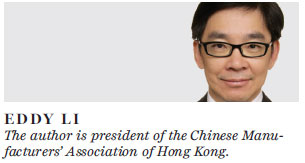Retirement security scheme in Hong Kong should be flexible
Updated: 2015-08-04 09:08
By Eddy Li(HK Edition)
|
|||||||
Almost every country or region in the world today is facing the increasingly severe problem of a growing aging population. Hong Kong is no exception. How the government manages to ensure that the elderly have decent living conditions has become a common concern of all people.
Recently the Chinese University of Hong Kong Jockey Club Institute of Ageing released a research report, in which it ranked Hong Kong 24th of 97 countries and regions around the world in overall living conditions for the elderly. The report was developed on the strength of the Global AgeWatch Index 2014 released by HelpAge International. This measures how well 96 countries are supporting their elderly population. It is based on four aspects vital to the well-being of old people: Incomes, health, capability and enabling environment. Although Hong Kong's overall ranking of 24th is above average, some of its sub-indexes are not so satisfactory: The city is ranked 91st in relative welfare and 95th in the poverty rate.
Although living conditions in Hong Kong are relatively good in general, the elderly still face the problem of poverty. Against this background, the latest retirement security proposal forwarded by Professor Nelson Chow Wing-sun of the University of Hong Kong has drawn much attention.
Previously, Chow headed a retirement study commissioned by the government's Commission on Poverty. And last August, he presented a report which proposed a pension scheme. The scheme, to be supported by tripartite financing of the government, the employer and the employee, would have afforded every citizen aged over 65 with a monthly pension of HK$3,000. It was proposed as a replacement for the Old Age Living Allowance and the Old Age Allowance (fruit money).
But this proposal failed to win public support because it was difficult to reach a consensus on the requirement that those who were now working would have to finance those who had retired and were entitled to a HK$3,000 monthly pension for free.
There are two major changes in Chow's new proposal: The first one is to make the government the sole contributor of funds, avoiding the issue of contribution from the employer and the employee; the second is to postpone the qualifying age from 65 to 70. The amount of the monthly allowance stays unchanged at HK$3,000.
Currently, more than 510,000 receive the Old Age Living Allowance and the Old Age Allowance. If the new retirement plan is enacted and implemented, it is estimated that another 50,000 elderly people will be eligible to apply for the higher pension. The retirement protection scheme will then cover more than 560,000 persons. However, we also have to take into account the fact the population is ever aging, which will require higher expenditure year after year. It is estimated the proposed funding of HK$50 billion can only cover the plan for seven years.
Even Chow admitted he was not sure whether public finances would be able to cope with the spending required by this scheme. Therefore, his plan raises the qualifying age to 70, and attaches a flexible measure - linking the qualifying age with life expectancy. This means that the qualifying age is not necessarily fixed at 70. When life expectancy rises, the qualifying age should be delayed correspondingly. The span between both ends is temporarily set at 14 years, so as to stabilize government spending.
The most important thing for effectively controlling public expenditure is to avoid misuse. In Canada, for example, the actual allowance differs from person to person, depending on their income levels. In other words, the more over-65s that are employed, the less the burden the government has to shoulder. Hong Kong could design its own scheme with reference to such an arrangement.
This could be achieved by creating a suitable environment for people to postpone their retirement. On the one hand, this would provide a platform for the elderly to make full use of their remaining capability, while on the other, the social welfare system would face less financial pressure.
According to the latest age classification by the World Health Organization, 65 is still part of the adulthood stage. If the community forces all healthy people aged 65 to retire, it will waste a lot of human resources.

(HK Edition 08/04/2015 page9)